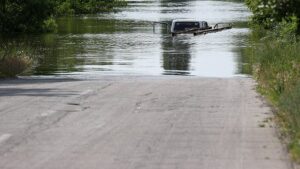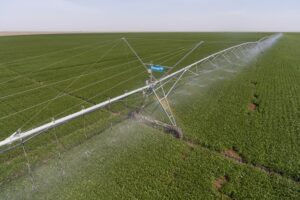
The head of Kherson city military administration Roman Mrochko reported a decrease in the water level in Kherson region.
“I inform you: in Stepanovka village (Kherson city community of Kherson district – IF-U) the water level has dropped by 35 cm,” Mrochko wrote in his Telegram channel on Friday.

JSC “Ukrzaliznytsia” (UZ) in May 2023 transported 1836 thousand tons of grain cargo, which is 33% less than a month earlier, said deputy director of the department of commercial work UZ Valery Tkachev at a meeting with representatives of agrarian business on Thursday.
According to his information 1147 thousand tons of grain cargo were sent for export last month, which is 46% less than in April. In domestic communication 683 thousand tons were transported, which is 16% less than in April. Average daily loading in May was 44 thousand tons.
“Two factors influenced the reduction of transportation – the blocking by the aggressor of the “grain corridor”, which affected the delivery of goods by rail to ports, as well as the blocking of exports through “solidarity corridors” by European countries, which led to a halving of cargo handling through the western borders of Ukraine”, – explained Tkachev.
He added that UZ is ready to increase transportation, for which it has sufficient resources.
According to the operational data of UZ, in the first week of June 2023 the volume of grain cargo loading was 380 thousand tons, or 15% of the total cargo. Average daily volumes of transshipment during this period amounted to 54 thousand tons, which is 2.2 times higher than in April.
According to Tkachev, the actual average daily volume of agricultural cargo transshipment through the border crossings in June 2023 increased by 90 cars compared to May. Grain cargo increased by eight cars per day.
A UZ representative said that 9,740 railcars, of which 1,084 railcars with grain cargoes, are heading toward the western border. The queue for agricultural commodities has decreased by 343 cars (24%).
“Wagon congestion is ‘dissipating,’ thanks to the balancing of border loads. As long as the grain corridor works, the load on the western borders is reduced. Also transfer through European countries became more active”, – UZ representative explained.
Speaking about the transshipment of grain at the Ukrainian-Polish border, Tkachev said that in May at the checkpoint “Yagodin-Dorohusk” average daily passed 17.3 cars with grain, crossing “Izov-Grubeshov” – 20 per day, crossing “Mostiska-Medica” – 22.13 per day. At the Romanian BCP “Vadul-Siret-Dornesti” average was 47.7 w/c with grain, BCP “Dyakovo-Halmeu” – 8.5 w/c.
At the Ukrainian-Hungarian border, grain cargo transshipment in May at BCP “Chop-Zakhon” was 39.5 per/c, at BCP “Bat’ovo-Betereshki” in May transshipment of 25.6 per/c was recorded, the maximum rate in May – 93.9 per/c.
“For all Western BCPs, if we analyze the statistics of the last five months, there is a sagging of shipments from one and a half to five times. The remaining restrictions on exports with the permission of transit significantly affect the export of grain through the western borders,” – summarized Tkachev.
The head of UZ reported that, as of June 8, 2023 in the direction of the ports of Greater Odessa moves 2663 railcars with grain cargo. The average daily unloading in June is 493 cars with grain. Unloading waiting time (queue) is 4.9 days.
As of June 8, 1,656 railcars with grain cargo are bound for Port Ismail. Since May 29, the queue decreased by 23.48%. The average daily unloading for June was 122 grain cars. Unloading waiting time (queue) reaches 11.3 days.
“The work of the “grain corridor” today is difficult to predict, the aggressor country constantly changes the number of inspections of ships and puts forward different requirements, in addition the work of the port “Southern” is blocked. The situation in the port of Izmail remains difficult because of the large accumulation of cars. Loading in the port direction is planned taking into account the processing capacity of consignees/operators, but due to weather conditions they unload significantly less than planned volume,” UZ noted.

The Supreme Court of the Netherlands upheld the decision of the previous court in the case on the fate of the “Scythian gold” from the collection of museums of the Autonomous Republic of Crimea and decided to transfer it to Ukraine, follows from the message on the website of the court.
“In October 2021, the Court of Appeal ruled that the collection should be transferred to Ukraine. This decision remains in force. That’s what the Supreme Court ruled today,” the message says.
As reported, the exhibition “Crimea. Golden Island in the Black Sea”, representing the collection of Scythian gold jewelry, was formed in the Allard Pearson Museum from the collections of five museums, one of which is located in Kiev, four – in Crimea. After the occupation of Crimea by the Russian Federation, which occurred after the opening of the exhibition, the question arose as to whom to return the collection – 565 museum items with a total insured value of EUR 10 million.
After the occupation, the Russian Federation claimed its rights to the part of the collection belonging to the Crimean museums. Ukraine, in turn, said that the exhibits cannot be returned to the occupied territory, which is temporarily not under Ukrainian control, and must be transferred directly to the state of Ukraine.
In December 2016, the District Administrative Court of Amsterdam recognized Ukraine’s rights to the collection and ordered it transferred to Kiev. In October 2021, the Court of Appeal of Amsterdam confirmed the decision of the court of first instance. After that, in January 2022, “Crimean museums” filed a cassation against the decision of the Court of Appeal.

Kakhovka canal supplied water to more than half a million hectares of land in the south and east of Ukraine, so the problem of irrigation will be the biggest in agriculture, its solution will take three to seven years, said Minister of Agricultural Policy Nicholas Solsky in the air of the telethon “United News”.
“The consequences of the cessation of irrigation are much larger. Not half a million hectares, but a million and a half hectares will not be used (for farming) to the fullest extent. It takes three to five to seven years to restore irrigation. And it should be a priority. For this is not only an issue of agribusiness, ecology, but also a social one. Farmers maintain social life in neighboring villages, pay taxes, pay landlords, who are mostly elderly people, for their shares”, said the Minister.
According to him, lands without irrigation systems will also suffer – farmers will have no working capital to cultivate them.
Solskyy reminded that farmers in the south of Ukraine used to get their main and stable income from crops from fields that had irrigation systems.
The Minister also noted that the Kakhovka reservoir was the source of two irrigation and water supply systems – the Kakhovka system and the North Crimean Canal. These systems were built based on water levels to minimize the use of electricity for pumps. Now the water level has dropped, so water simply does not reach the systems. To raise it, it is necessary to restore the dam.

The epidemiological situation in Odessa remains stable and controlled, the press service of the Odessa city council said.
“The incidence of acute intestinal infections in Odessa over the past week decreased by 44.6% and amounted to 56 cases, of which 55.4% – children. There are 42 patients with acute intestinal infections in the city infectious diseases hospital, 12 patients were admitted yesterday, which is not a high level for this period of the year,” the message indicated in the Telegram channel on Friday.
Earlier, the media reported that an epidemic of intestinal infections could start in Odessa due to the bombing of the Kakhovskaya HPP by the Russians.

German President Frank-Walter Steinmeier has signed a law to reduce the number of seats in the Bundestag from 736 to 630, German media reported.
“The reform aimed at reducing the number of Bundestag deputies comes into force. Steinmeier signed the relevant law,” the Zeit newspaper reported, citing the president’s office.
The newspaper recalls that earlier in March, the bill was passed by the Bundestag.
The law, in addition to reducing the number of parliamentary seats, provides for the introduction of a hard barrier of 5% to get into the Bundestag. Options, which until now allowed to get into parliament without passing this barrier are abolished.
The Bavarian state government and the Christian-Social Union Party are going to take the law to court because they believe that it violates the constitution.